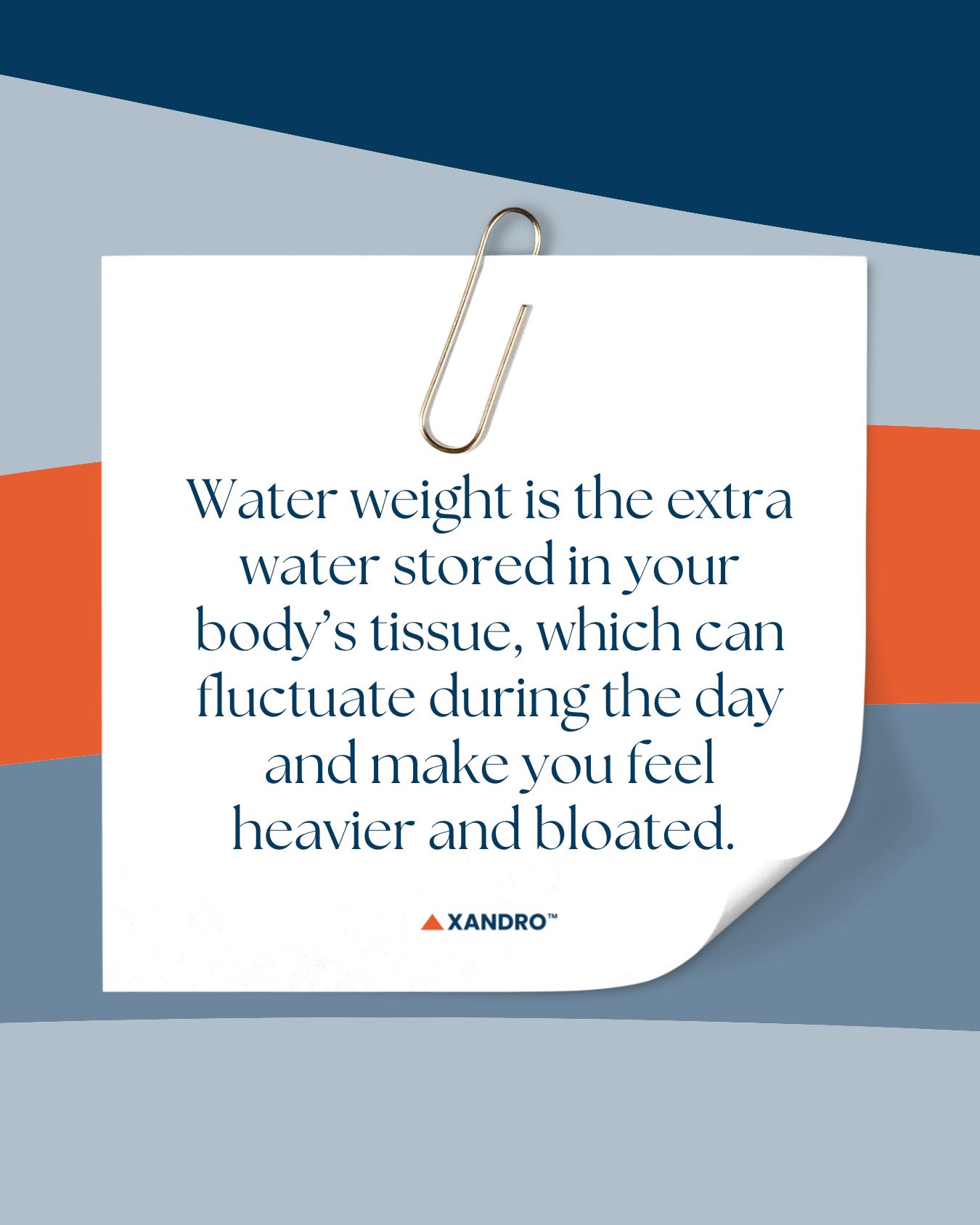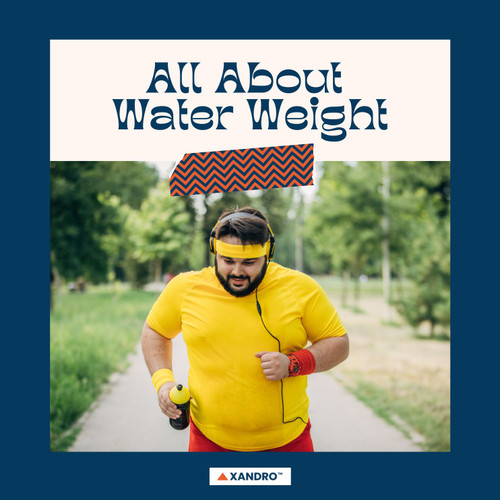All About Water Weight Loss
10th Dec 2024
Understanding Water Weight: Causes, Prevention and Solutions
Ever noticed your weight fluctuating from one day to the next without any major changes in your diet or lifestyle? This is likely due to water weight, or edema, a temporary condition caused by the build-up of excess fluid in your body.
Although it’s usually harmless, water weight can make you feel bloated, puffy or uncomfortable.
This article will talk about what causes water weight, how to prevent it and effective ways to reduce it naturally.
Products mentioned in this article:
What is Water Weight?
Water weight refers to the extra water stored in your body’s tissues — it’s not the same as body fat. Water weight can fluctuate throughout the day and can make you feel heavier or bloated.
The human body is made up of approximately 50–60 per cent water, which is needed for maintaining critical functions like temperature regulation, digestion and circulation, but factors like diet, hormones and lifestyle can sometimes cause your body to retain more water than it needs, resulting in water weight.
Is water weight bad? Water weight is a natural part of your body’s processes, but excess water retention might indicate a poor diet, hormonal changes or other health issues.

Causes of Water Weight
There are several common water retention causes. Understanding these can help you identify and address the root causes:
- High Sodium Diet: Sodium, found in table salt and many processed foods, plays a major role in fluid balance. When you eat too much sodium, your body retains water to maintain the proper sodium-to-water ratio.
- High Carb Intake: Carbohydrates are stored in the body as glycogen, which binds with water. For every gram of glycogen stored, your body retains approximately 3–4g of water. Switching to a low-carb diet often results in rapid initial weight loss due to the depletion of glycogen stores and the water that accompanies them.
- Inactivity: Sitting or standing for long periods can cause fluids to pool in your legs and feet, leading to swelling. This is common for people with desk jobs or during long flights.
- Hormonal Changes: Hormones can significantly affect water retention, particularly in women. For example, many women experience bloating and swelling in the days leading up to their period due to hormonal fluctuations. Hormonal changes and increased blood volume during pregnancy and when on contraceptives can also lead to swelling, especially in the legs and feet.
- Chronic Conditions: Certain medications, like corticosteroids, antidepressants or hormonal contraceptives, can cause water retention. Chronic conditions like heart, liver or kidney diseases can also disrupt fluid balance, leading to persistent water weight.
Further Reading: Top Ways to Increase Your Metabolism
How to Reduce Water Weight Naturally
So, ‘how do I get rid of water weight quickly?’ Here are some simple, science-backed methods for how to lose water weight:
1. Reduce Salt Intake
Reducing sodium intake is one of the most effective ways to combat water retention. Aim for less than 2,300mg of sodium perday, as recommended by dietary guidelines.
- What to Avoid: Processed foods like chips, canned soups, frozen meals and deli meats are often loaded with hidden sodium.
- What to Eat: Choose fresh, whole foods like vegetables, fruits, nuts and seeds, which are naturally low in sodium. Foods high in potassium, such as bananas, avocados and leafy greens, can help counteract sodium’s effects by encouraging the body to excrete more water.
2. Stay Hydrated
Hydration and weight loss might sound contradictory, but drinking more water helps your body shed excess fluid. When you’re dehydrated, your body clings to water as a survival mechanism.
- Daily Goal: Aim for 2 litres of water per day, and replace sugary or caffeinated drinks with plain water or herbal teas.
- Fun Fact: Proper hydration improves kidney function, helping to flush out excess sodium and water more efficiently.
3. Cut Back on Carbs
Lowering your carb intake can help reduce water retention because glycogen stores shrink, releasing the water that’s stored with them. You need 130g of carbs to function each day, but our diets often include much more than this. Try swapping carb-heavy foods like bread, rice and pasta with lean proteins (chicken, eggs, tofu) and healthy fats (avocado, olive oil).
4. Get Moving
Physical activity helps reduce water weight in several ways.
- Sweating: During exercise, your body expels water and sodium through sweat.
- Improved Circulation: Movement helps prevent fluids from pooling in your extremities.
- Glycogen Burn: Exercise burns glycogen stores, which releases the water bound to them.
You might even want to try following up with a relaxing sauna session to improve water loss and reduce fluid retention in the abdomen.
Further Reading: The Role of Exercise in Weight Loss
Potassium counteracts sodium and helps your body flush out excess water. Potassium-rich foods include bananas, spinach, potatoes and avocados.
Further Reading: The Role of Diet in Weight Loss
Certain supplements can help your body shed excess water:
- Vitamin B-6 and Magnesium: These are particularly effective for managing PMS-related water retention.
- Dandelion Extract: Known for its diuretic properties, dandelion may encourage your kidneys to excrete more water and sodium.
Always speak with a doctor before starting new supplements to check if they’re safe for you.
7. Use Water Weight Pills (Diuretics)
Prescribed diuretics can help remove excess water by making you urinate more but should only be used under a doctor’s guidance. Pills are not for long-term use, especially since there are plenty of other ways to help with water retention.
There are certain foods and herbs with natural diuretic properties that can help with water weight loss, though. These include:
- Asparagus
- Parsley
- Hibiscus tea
- Corn silk
While these options are generally safe, scientific studies on their effectiveness in humans are still limited.
Further Reading: Best Weight Loss Strategies to Slim Down
When to See a Doctor for Water Retention
While water weight is often harmless, certain symptoms may indicate underlying health issues. What does water weight look like in extreme cases?
- Severe Swelling: Especially in the ankles, feet or legs, accompanied by skin that feels tight or shiny.
- Breathing Issues: Fluid buildup in the lungs can cause shortness of breath, which may be a sign of heart or kidney problems.
- Pitting Edema: A condition where pressing on swollen areas leaves a visible indentation.
If you notice these symptoms or if your water retention doesn’t improve within a few days, don’t hesitate to speak with your doctor.
Further Reading: Problems with Existing Weight Loss Strategies
How Much Water Weight Can You Lose in a Day?
This depends on your activities and habits. Through sweating, urination, and normal bodily processes, you can lose as much as 2.3kg of water in a day. Athletes or people in hot climates can lose much more, especially if they sweat heavily.
End Note
Water weight might cause temporary discomfort, but it’s manageable with small changes:
- Eat smart: Reduce salt and carb intake, and boost potassium-rich foods.
- Stay active: Regular exercise improves circulation and reduces fluid buildup.
- Hydrate wisely: Drink plenty of water to prevent dehydration-induced retention.
If persistent, water retention could signal a more serious condition like edema. Always speak with your doctor for more clear medical advice, but remember, for the most part, your weight can fluctuate due to water retention — it’s natural and temporary. Embrace healthy habits and your body will balance itself out!
You can also help burn off visceral fat, that stubborn fat often found in the lower stomach, using Xandro’s Lean XP. It helps reduce sugar cravings, improve exercise performance and shed body fat, all needed to help you lose weight!
